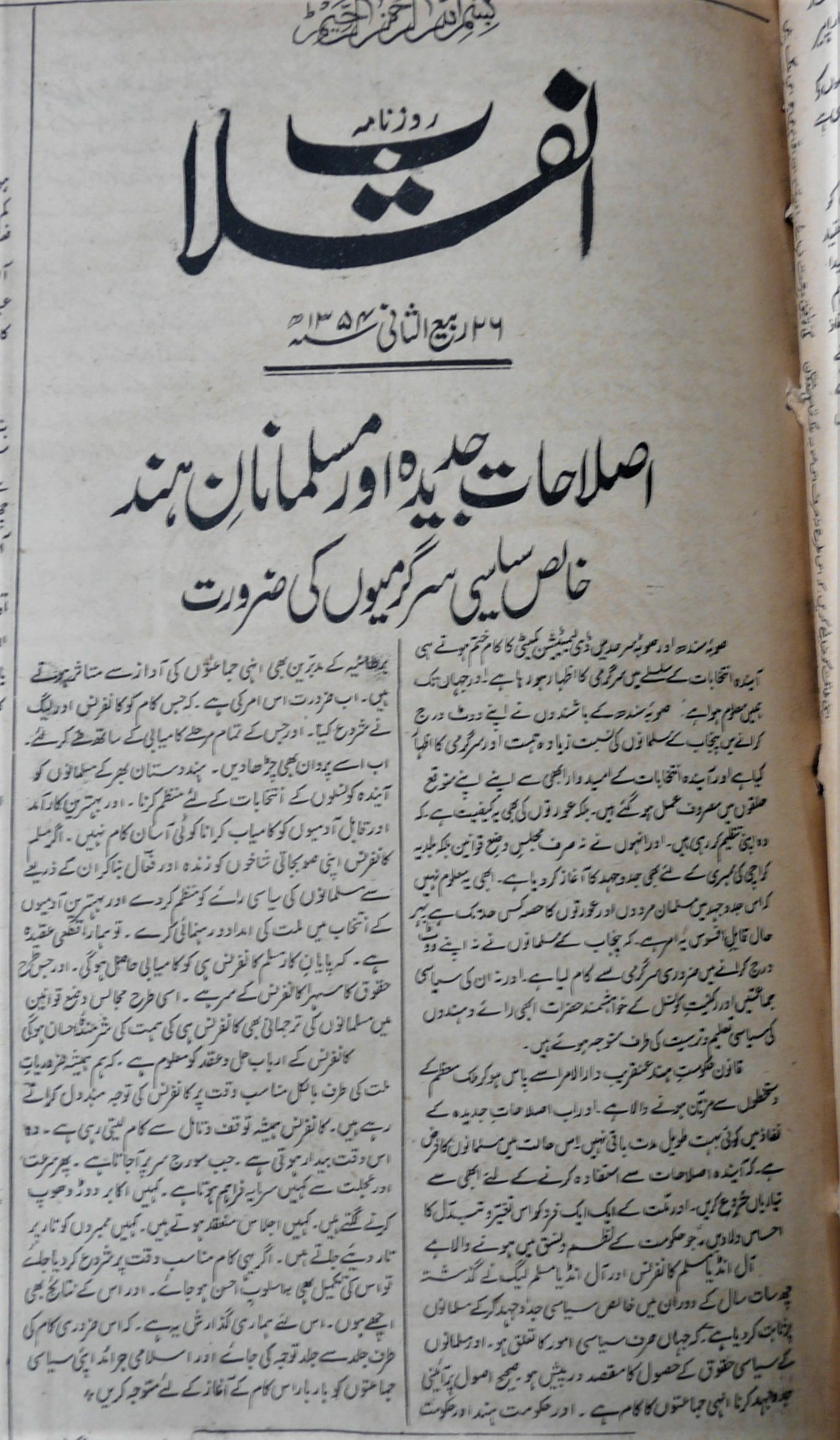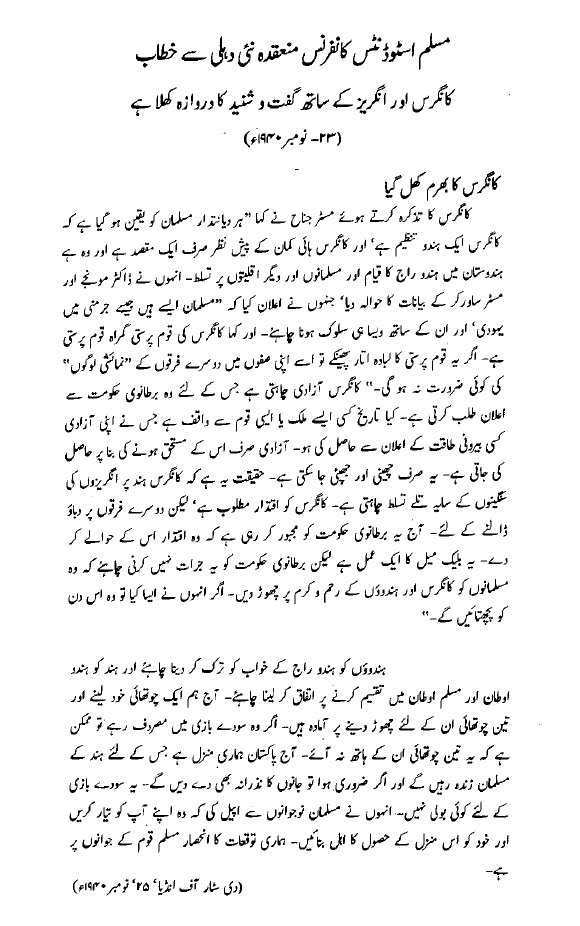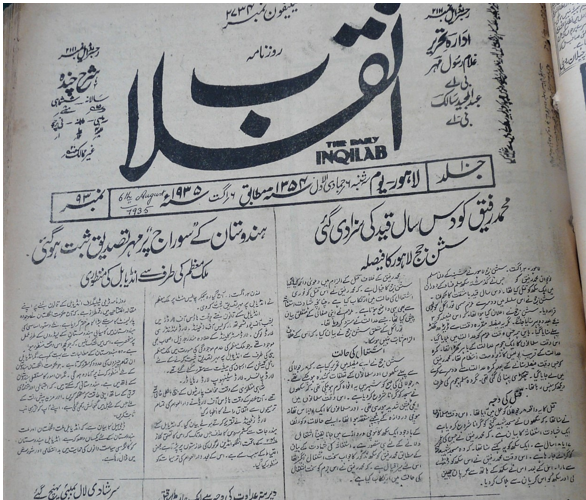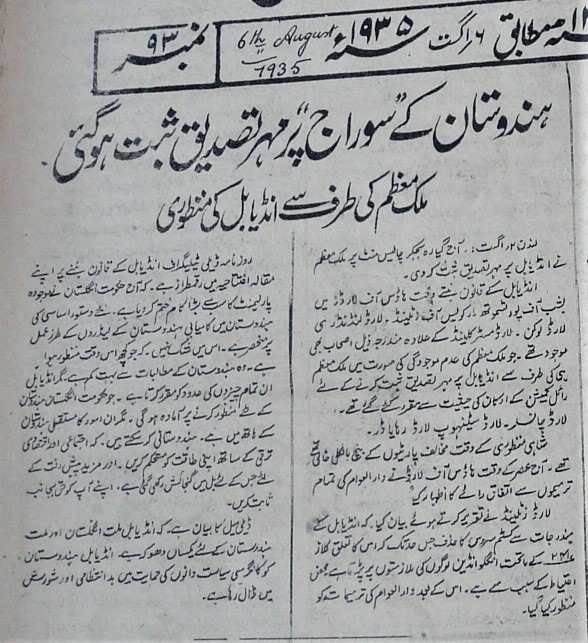فیس بک پوسٹ پر کئے جانے والے تبصرے
منتخب تبصرے
تبصرہ نگار
| Baber Zaman | Amjed Saleem Alvi | Irfan Mirza |
Naseer Akhter
So far, Mr. Jinnah’s speech has amply confirmed what his detractors have been saying all along — and by which I initially didn’t set much store — that most of his separatist politics was actuated by psychological factors.
Ever since Gandhi’s advent on the Indian political scene, Jinnah, who could never accept to be a second fiddle to anyone, had felt side-lined and slighted.
Hence Mr. Jinnah’s rhetorical question to Gandhi — ( I quote from his speech:
“Why not come as a Hindu leader proudly representing your people, and let me meet you proudly representing the Mussalmans?”
ترجمہ:
اب تک، مسٹر جناح کی تقریر نے اس بات کی کافی حد تک تصدیق کر دی ہے کہ ان کے مخالف ہر وقت کیا کہتے رہے ہیں – اور جس کے بارے میں میں نے شروع میں زیادہ زور نہیں دیا– کہ ان کی علیحدگی پسند سیاست کا زیادہ تر حصہ نفسیاتی عوامل پر مبنی تھا۔ ہندوستانی سیاسی منظر نامے پر گاندھی کی آمد کے بعد سے، جناح، جو کبھی بھی کسی کی ماتحتی قبول نہیں کر سکتے تھے، خود کو تنہا اور کمترمحسوس کر رہے تھے۔
اس لیے مسٹر جناح کا گاندھی سے کیا گیا سوال — (میں ان کی تقریر سے اقتباس کرتا ہوں ” ایک ہندو لیڈر کی حیثیت سے آپ لوگوں کی نمائندگی کرتے ہوئے فخر سے کیوں نہیں آتے تاکہ میں مسلمانوں کی نمائندگی کرتے ہوئے آپ سے ملوں؟“
Irfan Mirza
Naseer Akhter
میں اسے ایک اور نظر سے دیکھ رہا ہوں۔ جناح چونکہ مسلم اقلیت کے واسطے زیادہ سے زیادہ رعایتیں حاصل کرنے کے لیے کوشاں تھے، اسلیے انکے سامنے مسلمانوں کی یکجہتی اور ایک آواز بہت زیادہ اہمیت کی حامل تھی۔ انکی خواہشات کے برعکس انڈین نیشنل کانگریس مسلمانوں کی نمائندہ جماعت ہونے کی بھی دعویدار تھی۔ یہ تسلیم کر لینے سے انگریز سے مذاکرات کی میز پر جناح کی حیثیت کمزور پر سکتی تھی۔ یہ جناب جناح کو کسی صورت بھی قبول نہیں تھا۔ اس امر کی بہت سی مثالیں دی جا سکتی ہیں۔
Naseer Akhter
Irfan Mirza
جناح ایک سیکیولر سیاسی جماعت کو کیسے مجبور کر سکتے تھے کہ وہ ایک مذہبی شناخت اپنا لے؟
Irfan Mirza
Naseer Akhter
یہ اپنی جگہ ایک قابل غور سوال ہے اور اس پر بحث کی جا سکتی ہے۔ یہ الگ بات ہے کہ انیس سو چھیالیس تک انڈین نیشنل کانگریس کے اس سیکولر لبادے میں بڑے بڑے چھید نمایاں ہونا شروع ہو چکے تھے۔
Naseer Akhter
Irfan Mirza
True! Blunders were committed by all sides. But it is not a blame game we are playing here. Trying to understand the contradictions and their possible solutions in historical perspective.
Jinnah was at pains to proclaim that in his proposed Muslim homeland, the majority (Muslims in this case) will guarantee adequate safeguards for the protection of Non-Muslim minorities.
But he was unwilling to accept the same assurance by the Congress re the Non-Hindu minorities in a united India.
Please correct me if I am wrong.
ترجمہ:
صحیح! ہر جانب سے غلطیاں ہوئیں۔ لیکن یہ کوئی الزام تراشی کا کھیل نہیں ہے جو ہم یہاں کھیل رہے ہیں۔ تضادات اور ان کے ممکنہ حل کو تاریخی تناظر میں سمجھنے کی کوشش ہے۔
جناح کو یہ اعلان کرنے میں تردد تھاکہ ان کے مجوزہ مسلمانوں کے وطن میں، اکثریت (اس معاملے میں مسلمان) غیر مسلم اقلیتوں کے تحفظ کے لیے مناسب تحفظات کی ضمانت دے ۔
لیکن وہ متحدہ ہندوستان میں غیر ہندو اقلیتوں کے لیے کانگریس کی اسی یقین دہانی کو قبول کرنے کو تیار نہیں تھے۔
اگر میں غلط ہوں تو براہ کرم مجھے درست کریں۔
Irfan Mirza
Naseer Akhter
جناح کا استدلال قدرے مختلف تھا۔ اسی وجہ سے کچھ لوگوں نے اسے Hostage Theory
کا نام دینا پسند کیا۔ وہ سمجھتے تھے کہ انڈیا کی وحدت کے زیر سایہ دو خودمختار ریاستیں قائم کر دی جائیں جن میں دونوں طرف فریق مخالف کی حمایت یافتہ مذہبی اقلیت موجود ہو۔ ہر ریاست ان اقلیتوں کو آئین کے تحت تحفظ اور آزادی فراہم کرنے کی پابند ہو۔ اس میں دونوں ریاستوں کے زیر تسلط، دوسرے کی حمایت یافتہ مذہبی اقلیت کی موجودگی اس آئینی شق کی پاسداری کی ضمانت تھی۔ ورنہ ہم سے بہتر کون جانتا ہے کہ آئین منسوخ، معطل یا معلق کرنے کے لیے صرف بندوق اور ایک شریف الدین ہی کافی ہوتا ہے۔ لگتا ہے کہ جناح یہ بات خوب سمجھتے تھے۔
Naseer Akhter
Muhammad Mashhood
I have been searching the Govt. of India Act 1935 for provisions of the franchise ie the criteria for eligible voters who could cast vote in elections for the provincial and central assemblies.
Please help.
Muhammad Mashhood
2nd August 1935
Government of India Act 1935
The Act was written in a legal style, organised around 11 ‘Parts’ and 10 ‘Schedules’. Each part was further divided into chapters. It is considered to be one of the longest pieces of legislation passed by the British parliament – parliamentary debates around the Act involved 2000 speeches.
Some of the key features of the Act were:
The creation of a ‘Federation of India’ that consisted of two levels: a central executive and parliament, and below it, provinces and princely states.
It discarded the ‘dyarchy’ system at the provincial level and allowed for the emergence of popularly elected provincial legislatures. Dyarchy was introduced at the central level, key subjects like defence and foreign affairs were under the direct control of the Governor General.
A federal court was established.
The franchise was expanded to 14% of the population from 3%.
Separate electorates were provided for Muslims, Sikhs and others, but not to Depressed Classes.
Governor enjoyed critical emergency powers.
For details pl visit,
https://www.legislation.gov.uk/ukpga/1935/2/pdfs/ukpga_19350002_en.pdf
Naseer Akhter
Muhammad Mashhood
I’ve gone through all 300+ clauses. This document does NOT provide the requisite information.
Naseer Akhter
Muhammad Mashhood
You may look up the schedules/annexures to the Act.
Amjed Saleem Alvi
یہ ایکٹ کس تاریخ کو آیا؟ میں نے اگست 1935 کا انقلاب چھان مارا، کچھ نہیں ملا۔ ہاں ایک اداریہ جولائی میں ملا، جس میں ایک شق کے متعل احتجاج تھا اور مسلمانوں سے کہا گیا تھا کہ احتجاج ریکارڈ کروائیں تا کہ تبدیل کروایا جا سکے، تب تک ایکٹ نافذ نہیں ہوا تھا۔ لیکن تاج نے کسی تبدیلی سے انکار کر دیا تھا۔
Naseer Akhter
Amjed Saleem Alvi
The Act is dated 2nd of August, 1935.
Amjed Saleem Alvi
27 جولائی کا اداریہ دیکھیں، ابھی دارالامرا سے ایکٹ نے پاس ہونا ہے اور پھر بادشاہ سلامت کے پاس جانا ہے

Naseer Akhter
Muhammad Mashhood

مونجے اور ساورکر ہندو مہا سبھا کے فکری گورو تھے۔ ان کا کانگریس سے کوئ تعلق نہیں تھا۔ گاندھی کا قاتل انہی کا پیرو کار تھا۔
Muhammad Mashhood
ڈاکٹر صاحب مخالفین کی جانب سے کسی ایک برادری کے لیڈر کا نظریہ، سوچ اور عمل اس پوری برادری پہ تھوپ دینا برصغیر کی سیاست کا پرانا وطیرہ ہے۔ ڈاکٹر مونجے اور ویر ساورکر انتہا پسند ہندو تھے اور قائدِ اعظم کانگریس پہ یندو انتہا پسندی کا الزام لگا رہے تھے اس لئے انہوں نے مونجے اور ساورکر کا حوالہ دیا۔
Baber Zaman
Amjed Saleem Alvi Sb
Sir,
This Act was passed by both Houses of British Parliament in 1935
But
It came into effect in 1937.
Here is the internet reference :
********
Overview.
Government of India Act 1935
Aim An Act to make further provision for the Government of India.
Commenced
1st April 1937
*********
Amjed Saleem Alvi
سر بالکل درست لیکن اخبار میں تو چھپ جانا چاہیے۔ جون 1947 کا منصوبہ 3 جوں کا اناؤنس ہوا اور فورا” اخبار میں چھپا، بادشاہ نے دستخط غالبا” جولائی کے وسط میں کیے۔ اب یاد نہیں میں نے وہ خبر پوسٹ کی تھی یا نہیں۔
Muhammad Mashhood
Amjed Saleem Alvi
لیکن امجد بھائی یہ تو بہت مشہور و معروف ایکٹ ہے۔ حیرت ہے یہ انقلاب میں کیوں نہیں چھپا۔
Amjed Saleem Alvi
Muhammad Mashhood
اسی بات پر مجھے حیرانی ہے۔ اس کے متعلق خبریں ہیں، ایکٹ نہیں مل رہا۔ اب ایک ایک تصویر دیکھتا ہوں، کہیں میری نظر نہ چوک گئی ہو۔ ابھی تو جولائی 1935 سے مسجد/گورودوارہ شہید گنج کے قضیے پر خبریں پوسٹ کرنے لگا ہوں۔
Muhammad Mashhood
Amjed Saleem Alvi
The Government of India Act, 1935 was passed by British Parliament in August 1935. With 321 sections and 10 schedules, this was the longest act passed by British Parliament so far and was later split into two parts viz. Government of India Act, 1935 and Government of Burma Act, 1935.The demand for constitutional reforms in india has been quite old.
The Government of India Act, 1935 derived material from four key sources viz. Report of the Simon Commission, discussions at the Third Round Table Conference, the White Paper of 1933 and the reports of the Joint select committees. This act ended the system of dyarchy introduced by the Government of India Act 1919, and provided for establishment of a Federation of India to be made up of provinces of British India and some or all of the Princely states. However, the federation never came into being as the required number of princely states did not join it.
It was the last constitution of British India which split Burma from it. It lasted until 1947, when British territory was split into Pakistan and India.
Naseer Akhter
Muhammad Mashhood
The specifications of the franchise (criteria for eligible voters) may be found in one of the schedules. These, however, are NOT included in the text of the Act posted on the internet.
Muhammad Mashhood
Naseer Akhter
Baber Zaman
Amjed Saleem Alvi Sb
Sir,
Some times acts do not get any attention , or they are not considered important enough .
One example of this is the signing of the
Treaty of Rome on 25 March 1957.
The BBC correspondent in Rome had, on that day, sent a two-line telegram to London saying that Foreign ministers of six countries who met in Rome today, signed a treaty to create the European Economic Community”.
……..
Fifty years later, in 2007, the BBC gave extensive coverage to the Golden Jubilee of that signing event.
The BBC broadcast and posted a very detailed report about the initial “two-line” coverage.
It also mentioned all the efforts made by the BBC to find the original telegram, and noted with regret that it could not be saved.
The reporter had become an old man.
At a time when the EEC had become a big institution of 28 countries, of 500 million people, and the world’s largest economy, and when the Golden Jubilee of that meeting of six in Rome was being celebrated, That reporter had become an extraordinary historical personality.
……..
The importance of an incident or event, some times, becomes known many years later, and it is often due to the big success or utter failure of that event, and of its impact on history.
The Government of India Act 1935 had had very deep and far-reaching impact on the Sub-Continent and its future.
But, in 1935, it was almost a non-event.
There were many Acts of the same name before 1935, but they all were not necessarily reported.
پیدا نہیں کچھ اس سے قصور۔ ہمہ دانی !
It is not necessarily the fault of those editors if they did not report the enactment of a law that had not shown any impact on politics at that time.
Your efforts to search, find and present published reports of rare events in national life, are just priceless!
One day, students will do Ph.Ds on your work and your contribution !
Jazak Allah !
Baber Zaman
Muhammad Mashhood Sb,
Sir Thank you۰
As a [former] newsman and reporter, the issues of coverage of events are usually of particular interest to me.
I do learn from this process.
Amjed Saleem Alvi
بابر زمان صاحب آپ کی باریک بیں نظر خبر کو جس انداز سے پرکھتی ہے، ہم جیسا عامی اس طرح خبر کہ تہ تک نہیں اتر سکتا۔ میں نے ایک چھوٹا سا اداریہ پیش کیا ہے۔ جب انڈیا ایکٹ شق وار منظور ہو رہا تھا، تب انقلاب کے مدیروں کی نظر ایک ایک شق پر تھی اور وہ اس کا بغور جائزہ لے رہے تھے اور جو شق مسلمانوں کے مفاد کے خلاف نظر آتی تھی، اس پر متوجہ بھی کرتے تھے۔ اس ایکٹ پر انقلاب کا اداریہ بھی ضرور ہونا چاہیے۔ اب غور سے دیکھتا ہوں۔ میرا احساس ہے پہلا صفحہ اسی کے لیے مخصوص ہونا چاہیے۔
Amjed Saleem Alvi
سر خبر مل گئی اور بابر زمان صاحب کے تجزیہ کا قائل ہو گیا۔ خبر پہلے صفحے پر ہے لیکن چھوٹی سی خبر ہے، میں پورے صفحے کی کوریج کی توقع کر رہا تھا۔ اس پر انقلاب کا کوئی اداریہ بھی نہ ملا۔ اس کی وجہ سمجھ میں آتی ہے، 1935 اور 1936 میں
مولانا مہر آشوبِ چشم میں مبتلا تھے اور سخت تکلیف میں تھے، گرما کا موسم دونوں سال انھوں نے شملہ ہلز میں کسولی میں گزارا تھا، مئی کے اواخر میں جاتے تھے اور ستمبر کے اوائل میں آتے تھے۔ 1935 میں کوئٹہ میں جو زلزلہ آیا، اس وقت بھی مولانا مہر کسولی میں ہی مقیم تھے۔ اگر مولانا مہر لاہور میں ہوتے تو طویل اداریہ ضرور سامنے آتا۔ دیکھتا ہوں شاید بعد میں لکھ کر بھیجا ہو۔ خبر یہیں پیش کر دیتا ہوں۔
Amjed Saleem Alvi

روزنامہ انقلاب لاہور، 6 اگست 1935ء

Muhammad Mashhood
Amjed Saleem Alvi
امجد بھائی یکم اپریل 1937 کے بعد کے شمارے بھی دیکھئے۔ کیونکہ یہ ایکٹ یکم اپریل 1937 کو نافذالعمل ہوا تھا
Amjed Saleem Alvi
Muhammad Mashhood
مشہود بھائی الیکشن کے بعد غالبا” فروری میں پنجاب میں حکومت قائم ہو گئی تھی۔ اگر آئین یکم اپریل کو نافذ ہوا تو الیکشن کس قانون کے تحت ہوے تھے؟ سرحد اور سندھ بھی صوبائی درجہ حاصل کر چکے تھے۔ یقینا” اسی آئین کے تحت یہ درجہ ملا ہو گا۔
Muhammad Mashhood
Amjed Saleem Alvi
امجد بھائی جب سوالات اٹھتے ہیں تو معاملات کے نئے پہلو سامنے آتے ہیں۔
اس ایکٹ کو شاہی منظوری یا Royal Assent دو مراحل میں ملا تھا۔ پہلا اگست 1935 میں جب کہ کچھ قوانین کا اپریل 1937 میں۔ الیکشنز 1935 کے منظور شدہ ایکٹ کے مطابق ہوئے تھے۔